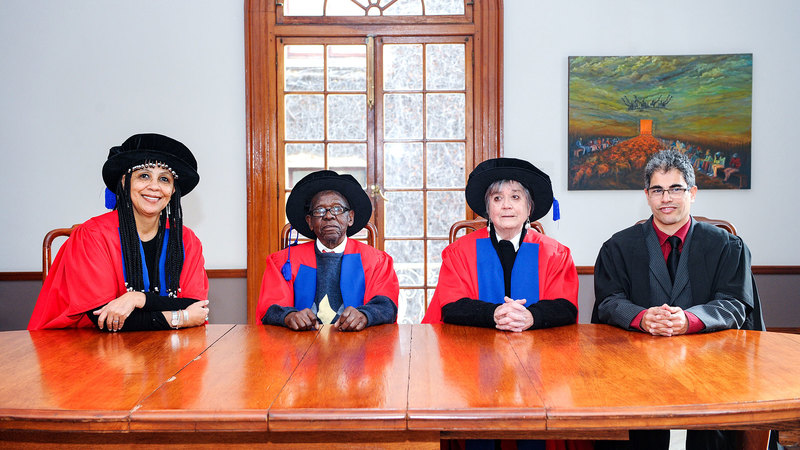Four distinguished South Africans receive UCT hon docs
26 July 2023 | Compiled by Niémah Davids. Photo Lerato Maduna. Read time 6 min.
On Friday, 21 July, the University of Cape Town (UCT) awarded several honorary doctorates in honour of four esteemed South Africans who have made indelible contributions to the country, the continent and the world.
The university awards high academic honours in the form of doctorate degrees (honoris causa) in recognition of top-rated work, led by esteemed South Africans across a multitude of fields, that have made a difference and contribution to society.
Josette Cole – Doctor of Social Science
Cole is a design thinker, researcher, analyst and writer. She is committed to promoting heritage by bringing to the forefront aspects of Cape Town’s rich history and culture. She epitomises exceptional scholarship, and her contribution to public service and knowledge creation in the country has been described as remarkable.
She is dedicated to documenting, foregrounding and honouring the stories and lived experiences of marginalised communities in the Western Cape. She also played a significant role in analysing and documenting the struggle for liberation, particularly during the important period of the country’s transition to democracy.
Over the years, Cole has published extensively outside of the academic realm. Instead, her work has focused on providing analysis and insight into community and organisational challenges and struggles – promoting heritage and bringing to the fore previously hidden or unattended aspects of Cape Town’s history.
Tete Mbambisa – Doctor of Music
Mbambisa is an acclaimed South African composer and pianist, and his work has influenced jazz scholarship both locally and abroad. His contribution to the field of music can be traced back to the 1960s, to the seminal recording of Inhlupheko, which showcased his extraordinary skills on the piano during a time when talents of this kind were rare, especially for black South Africans.
Like many of his peers at the time, Mbambisa was not afforded the opportunity to pursue a degree in music at university nor was he exposed to the musical transcription technologies available today that make studying the craft so much easier. He experienced the harshness of apartheid first-hand and responded to events such as the Sharpeville Massacre and the Soweto Uprising through his music.
Today, Mbambisa’s work lives on informally during jazz jam sessions and recordings by other artists and is seldom acknowledged in academia through curriculum or history. And though he has visited various South African higher education institutions and offered performance workshops, his work has not yet received thorough academic engagement. His long-standing contribution to South African arts and culture make him a deserving recipient of an honorary doctorate.
Dr Colette Solomon – Doctor of Social Science
Dr Solomon is the director of the Women on Farms Project (WFP) – a feminist South African non-governmental organisation that works alongside women farm workers and dwellers to capacitate and support them to understand and know their rights.
Solomon is a social justice activist, and her work has been focused on advancing gender and racial equity. Through her activism, studies and work experiences, she has honed her expertise in areas of rural development and women’s rights. Her agency has also allowed for people from marginalised communities to be seen and heard. Under her leadership, in 2015, WFP received the Institute for Justice and Reconciliation’s Reconciliation Award in honour of “20 years of shaping reconciliation by strengthening the capacity of women who live and work on farms”.
She has been described as a social change agent who has the innate ability to navigate different environments with ease. She has committed her life to improving the lives of the poor and the marginalised and has used research to inform policy advocacy – giving a voice to women.
Veronica Williams – Doctor of Music (posthumously)
Williams’ journey with dance started at the age of two, when her father would place her on top of a paraffin tin or on the piano, and she would dance while he played the instrument. After her father’s passing, she lived with her adoptive parents in District Six, and soon thereafter joined the Eoan Group – a community and cultural organisation that also offered ballet classes.
When her family was forcibly removed from District Six under the apartheid government’s Group Areas Act, her parents could not afford the transport fees from their new home in Bridgetown in Athlone to the city centre, and Williams was forced to end classes with the Eoan Group. Given her own enriching experiences with dance, she wanted to offer the same experience to young children and the youth, and in 1968 she founded the Wilvan Ballet School – a non-profit organisation, bounded by principles of non-racism, non-sexism and non-sectarianism.
Williams attained the Classical Ballet qualification by attending evening classes at UCT and was later invited to complete the Teachers’ Certificate Course, where she completed an Introduction to Spanish Dance, focusing on regional, classical and flamenco dancing. She also received the Mercedes Molina Award in 1985 and again in 1989, for being the best examination candidate in the Cape Province for both her Segundo Ano Estudiante and her Tercer Ano Estudiante final dance examinations. Due to ill health, she stopped all teaching and examining in 2010, but maintained contact with Wilvan teachers and dancers. Williams passed away on 8 October 2022.
 This work is licensed under a Creative Commons Attribution-NoDerivatives 4.0 International License.
This work is licensed under a Creative Commons Attribution-NoDerivatives 4.0 International License.
Please view the republishing articles page for more information.










